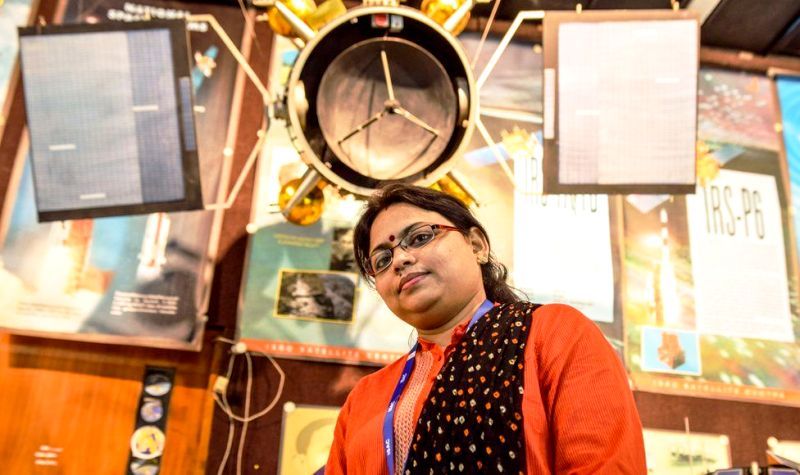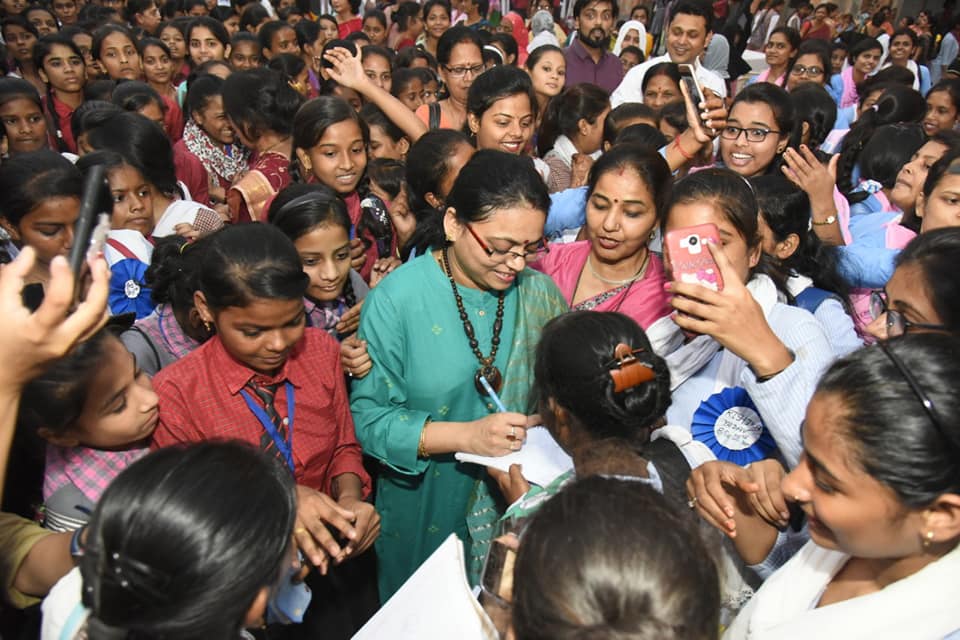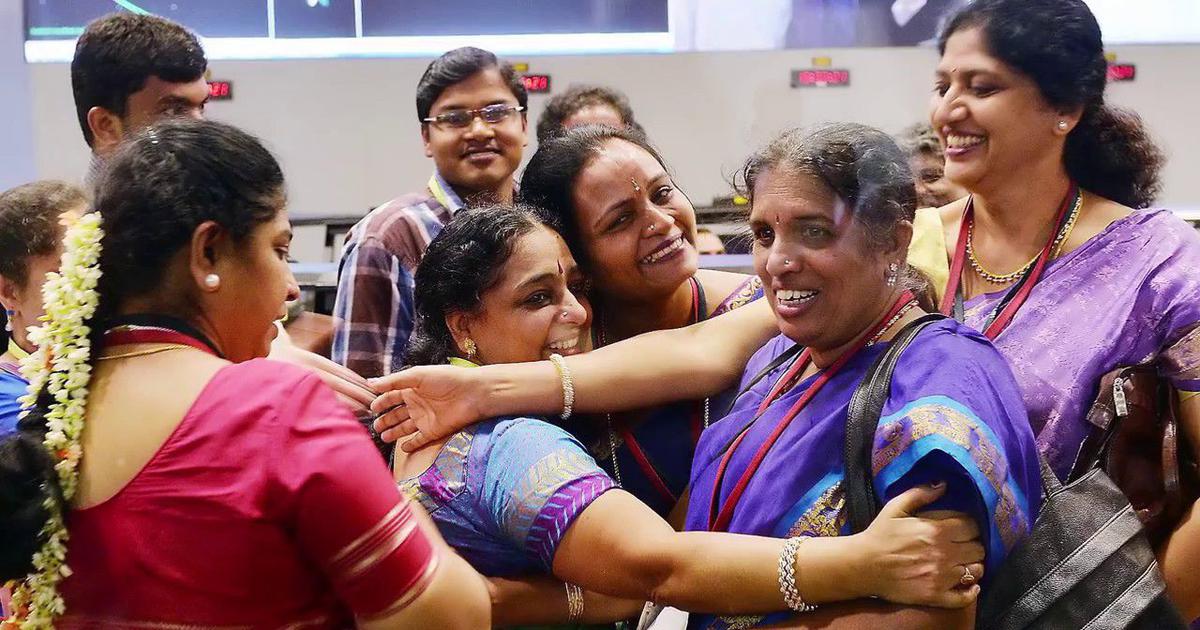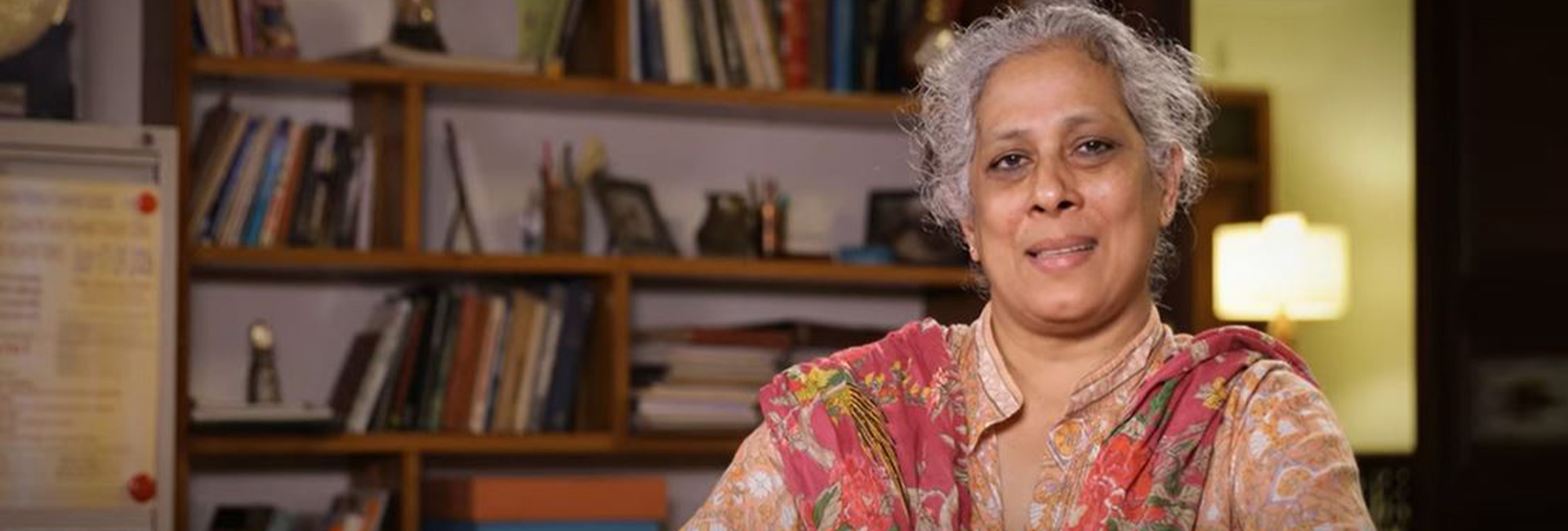(July 19, 2023) Ritu Karidhal Srivastava, popularly known as the Rocket Woman of India, is a renowned scientist at Indian Space Research Organization (ISRO). Carrying the hopes of an entire nation, Ritu is leading Chandrayaan-3, India’s third moon mission. The spacecraft (LVM3-M4) lifted off from Sriharikota in Andhra Pradesh on July 14 and is expected to reach the moon on August 23. If the mission is successful, it will make India the fourth country to achieve a controlled landing on the moon, after Russia, United States, and China. The captain of the Chandrayaan-3 mission, Ritu was also the mission director of Chandrayaan-2 and played a pivotal role in the successful Mars Orbiter Mission as deputy operations director.
Like many children around the globe, Ritu Karidhal Srivastava also spent her childhood marvelling at the night sky and dreaming of unfolding the mysteries that lay beyond its dark expanses. After years of diligence and hard work, Ritu’s dream came true when she joined ISRO, where she would go on to play a key role in some of the space agency’s most important missions and become a prominent figure in India’s space exploration pursuits. “When you are passionate about something. It keeps you going irrespective of hurdles. Don’t give up your dreams and passion,” said the Rocket Woman, in an interview by Google India.

Ritu Karidhal Srivastava, mission director, Chandrayaan-3
Modest beginnings
The eldest of four children, Ritu was born into a middle-class family in Lucknow. Despite the family’s limited resources, her parents placed great importance on education. “We didn’t have too many resources, and back then we certainly didn’t have tuitions or coaching institutions. We had to be self-motivated to succeed,” she said
As a teenager, Ritu’s hobby was collecting newspaper clippings of developments in NASA and ISRO, as well as everything related to space. Ritu also had a genuine passion for mathematics and physics – the former fascinated her so much, she would write poems on the subject.
Approaching her dream
After completing her BSc from Mahila Vidyalaya PG College, followed by an MSc in physics from the University of Lucknow, Ritu enrolled for a PhD in physics. Six months into the programme, Ritu, who was publishing research papers and working part time as a physics lecturer, also cleared the Graduate Aptitude Test in Engineering, one of India’s most competitive national-level exams.
An admission to join Indian Insitute of Science’s prestigious M.Tech programme posed a dilemma, as Ritu wanted to finish her doctorate. However, she knew that IISc would bring her closer to her dream of working at a space agency. “I have always had a fascination for the mysteries of outer space, and knew that’s what I wanted to get into,” she said. Her mentors encouraged her to join IISc, while her parents supported her and trusted her abilities, even though it meant sending her away to an unfamiliar part of the country – a journey of two-and-a-half days by their modest means.
Dream comes true
As soon as she completed her M Tech from IISC in 1997, Ritu applied and received a call from ISRO with an offer to join. “That was the best moment of my life – getting a call from ISRO. It was like everything I had before was all for that one moment,” she said.
At ISRO, Ritu was given the chance to join important projects almost immediately. Although several senior men were eligible for her first assignment, the project was given to her. She went on to do many more, working alongside stalwarts, which boosted her confidence and fuelled even bigger dreams.

Ritu Karidhal at Mahila Vidyalaya Degree College, Lucknow
“There weren’t too many women in ISRO when I joined. But I was never treated differently because of my gender. What matters here is your talent, not your gender,” she remarked.”
Mars Orbiter Mission – MOM
The most demanding project that came Ritu’s way was India’s Mars Orbiter Mission (MOM), Mangalyaan-1 – in 2012, she was appointed as the mission’s deputy operations director. India’s first interplanetary endeavour, Mangalyaan – 1 also had a tight deadline.
Ritu played a crucial role in developing the spacecraft’s autonomy system, often referred to as the ‘brain of the satellite’. Given the significant distance the spacecraft would cover, as well as the complexities involved in sending and receiving signals, Ritu led a team that created a software system designed to make autonomous decisions. Collaborating with scientists, electrical engineers, and mechanical engineers, the team successfully developed the autonomy system in a record-breaking 10 months.
“I had to ensure that it was all executed without any flaw or anomaly. With launching spacecrafts, the slightest anomaly can spell disaster, especially in the case of manoeuvres and mars orbit insertions. Every single detail had to be thoroughly vetted,” she said.
The project is considered the most cost-effective interplanetary project. Mangalyaan-1 was launched in 2013. It was the first time that any country reached Mars’ orbit in its inaugural attempt. The celebratory image of several women scientists who contributed to the mission spread worldwide. Ritu, along with numerous other women on the ISRO team, earned the title of ‘Rocket Women of India’.

Jubiliant ISRO scientists after the success of Mars Orbiter Mission
Interspersing responsibilities of MOM and being a mother
While Mangalyaan-1 brought immense success to ISRO, India, and space science, it also shattered gender stereotypes by demonstrating that scientists, regardless of gender, could work together to achieve extraordinary results. Like other women scientists Ritu remembers the challenges of balancing her personal and professional life during the 18 months of the MOM project. Her schedule had become busier than ever before, to the extent that after leaving work and assisting her children with homework, she would continue working from midnight to four in the morning.
“My children took a while to understand why their mom was suddenly so busy.” However, time management helped her successfully sail across. “Family, marriage, pregnancy breaks, children—these are all part of life and cannot be treated as mutually exclusive from your work,” she remarked adding “I did feel physically exhausted, but you can overcome this exhaustion in different ways. When you see the output and what you’ve achieved by putting in extra effort, that is worth it,” she smiles.
With the success of MOM, Ritu became an overnight celebrity. The girl who once collected space-related news clippings had transformed into one of India’s most renowned space scientists.
“At colleges where I was scheduled to talk, students would crowd around me excitedly to ask questions and I was so happy to see their enthusiasm on the subject,” she said adding, “My children were so excited that they told everybody in their school that their mom was a part of that project. But best of all was when my son came to me and told me, ‘Mom, I am proud of you.”
What the whole country expected out of the project was of utmost significance to the scientist. “To see it all, get realised in front of your eye is truly unforgettable.”
Indian women in STEM
After the triumph of Mangalyaan-1, ISRO embarked on its next high-profile mission, Chandrayaan-2, India’s first lunar rover mission in 2019. It presented the most challenging mission for ISRO, with the goal of landing a rover on the unexplored lunar south pole and gathering data on rocks, minerals, and water.
Ritu was appointed the mission director, while M. Vanitha served as the Project Director. It was the first space project to be jointly led by two women. In fact, women made up thirty percent of the Chandrayaan-2 team. Although the mission failed, ISRO’s women scientists received worldwide attention, putting Indian women in STEM into the global spotlight.
Moon Mission – Keeping the dreams alive
Ritu is now at the helm of Chandrayaan-3, India’s third lunar mission and its second attempt at a soft landing on the surface of the moon. It’s a chance of the nation to reach a new milestone and Ritu’s efforts are key. Congratulatory messages are pouring from far and wide for Ritu and her team of ISRO scientists who have worked day and night to make the mission successful.
Ritu exemplifies the aspirations and dreams of every middle-class Indian girl. She has set an example that with the right blend of confidence, passion, and support women can attain remarkable success, overcoming all the challenges that come their way.
Awards and accolades received by Ritu Karidhal Srivastava
- ISRO Young Scientist Award 2007, presented by the Late Dr Abdul Kalam
- ISRO Team Award for Mars Orbiter Mission – MOM, 2015
- Women Achievers in Aerospace award from the Society of Indian Aerospace Technologies and Industries, 2017




